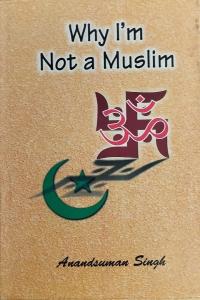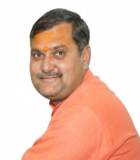Creation and Criticism
ISSN: 2455-9687
(A Quarterly International Peer-reviewed Refereed e-Journal
Devoted to English Language and Literature)
Vol. 09, Joint Issue 32 & 33: Jan-April 2024

Book Review
Why I’m Not a Muslim by Anandsuman Singh
Anandsuman Singh. Why I'm Not a Muslim. Dehradun: Saraswati Prakashan, 2008. Pp. 182. Rs. 200/-. ISBN: 978-81-906799-1-6.
Received on Dec 02, 2023; Accepted on Jan 05, 2024. Available online: April 10, 2024. This work is licensed under a Creative Commons Attribution-NonCommercial 4.0 International License
Reviewed by Abnish Singh Chauhan
In Why I'm Not a Muslim, Anandsuman Singh presents a very personal and philosophical contemplation about identity, religion, and the nature of Indian cultural and spiritual heritage. The book is not just a rejection of an earlier religious identity— it is, rather, an embracing of another view that the writer observes as being more in harmony with his inner beliefs and cultural heritage. With a riveting narrative of three decades of transformation, Mr Singh invites readers on a thoughtful journey that is at the same time nationalistic, seasoned with spiritual introspection, philosophical questions, and cultural espousal: “This book is not only a book. It is the first creation of my life. It contains my feelings and an essence of my self-studies. Of course, it is imperative to mention that during the past 28 years, every class, every creed (caste) and every part of the society has undergone a radical change. Hence, you all will have to take some parts of this book with that spirit of leniency” (p. 7).
Since the beginning, Mr Singh establishes that choosing to abandon Islam and embrace Sanatan Dharma is not a reaction of rejection reared by hatred but one born from a quest for truth, intelligibility, and wisdom. The structure of the book, the division into more than 30 chapters, signifies the richness and sophistication of his inquiry. Themed chapters vary from scriptural comparisons of Vedic traditions to Islamic thinking to larger philosophical issues like ‘Why did I Become a Hindu?’, ‘Why did I Leave Islam?’, ‘ Om in the Quran’, ‘Veda Mantras in Arabic Translation’, ‘Rebirth in Quran’, ‘Four Varnas-Four Mothers’, ‘Dayanand, the Revolutionary Sun’, ‘Casteism - Enemy of Mankind’, ‘Causes of India’s Decline’, ‘Revolution in Aryavarta (Bharat Desh) - Why?’, ‘National Solidarity and the Young Generation’ etc. Such themed chapters both argue for and attempt to constitute the universality, rationality, and humanistic nature of Vedic Dharma, “which teaches everyone to live and love like brothers” (p. 53).
The book is also an evidence of the personal transformation of Mr Singh. The turning point in his life— the loss of his father in 1979, followed by family betrayal, provoked a crisis of the soul and metaphysical quest. His withdrawal into Vedic scriptures under the tutelage of great spiritual mentors is portrayed vividly and honestly. The experience of his formal initiation into Vedic Dharma in 1981 is portrayed with ritual solemnity, not only a religious conversion, but a rebirth. His coming into being from Kunwar Rafat Akhlaq Raozada to Kunwar Anandsuman Singh is symbolic and literal abandoning of a past identity, a sign of an entire adoption of a new way of life: “My ancestors had changed their original faith and accepted Islam for the love and greed of a few pieces of gold coins and some feudal land. I made amends for the dangerous error and thus have returned to my real home” (p. 33).
One of the main messages that run through the book is Singh’s conviction about the timelessness and eternality of dharma. In the flap, he criticizes the contemporary misreading of religion as being identical with community or sect, claiming that authentic dharma is a personal, everyday practice linked with the universe and common human values. For Mr Singh, dharma is not variable, nor is it particularist; it is universal, like the sun or the air— present and necessary to everyone. It lies beneath his greater theme of universal religiosity and nationalist pride. He candidly writes, “There is only one Sun, one Moon; undivided air, fire, water, earth and God Almighty are all one. Then how can dharmas be so many? ‘Isms’, creeds, communities, religions are but based on the flight of fancy of individuals. Dharma is intrinsically connected with the individual’s daily life” (p. 3).
The narrative voice is intimate and assertive. Mr Singh’s narrative of his love with his wife Saraswati Singh, the birth of their children, and the grief at losing her in 2001 provides a poignant shot of humanity to what could otherwise be an entirely ideological work. Mr Singh writes, “In between cruel hands of destiny snatched away Saraswatiji. It took life out of Anand. But life is life. After a gap of two and a half years, friends, colleagues and sons doled Anand, who was born in a Kshatriya clan, out of banishment and brought him back into the social stream” (p. 7). The personal reflections provide grounding and make the book accessible. His own depiction of Saraswati Suman— not only as a magazine but as a living embodiment of his late wife— indicates the profoundly emotional and spiritual nature of his path.
One of the most glaring qualities of this book lies in his statement that ‘Our India is the Best of All Lands’, which is the culmination of a lifetime spent pursuing spiritual integrity and national pride. Hence, the concluding chapter, ‘Best of All in the World, is our own India’, summarizes this patriotic ethos suffusing the volume. For Mr Singh, India is not merely a geopolitical entity, but a holy land where the ethos of tolerance, diversity, and spiritual quest thrives. He envisions India as the symbol of humanism, a land where any spiritual path is embraced, thereby making it a model for world harmony: “This land inspires man to practical humanism and welfare of all beings” (p. 179).
The breadth of topics covered in Why I’m Not a Muslim— from scriptural analysis to poems like ‘Onwards and Onwards’ and ‘Imagination’, from philosophical reflections to futuristic planning for Arya Samaj— makes it a hybrid work, part autobiography, part spiritual treatise, and part cultural manifesto. The presence of speeches, articles, and musings spanning almost three decades of activism demonstrates Mr Singh’s dedication to the Vedic cause and his wish to inspire a cultural renaissance based on what he perceives as the original values of Bharat.
Concurrently, the book is not free of criticism. Mr Singh’s criticisms of Islam, especially in chapters— ‘Irrationality in Quran’ and ‘Women in Quran’, though based on his own understanding and experience, might appear to be polemical or in some sense controversial to some readers. However, this is also what makes the book so authentic— it is a work of lived experience and heartfelt belief, not a detached scholarly critique.
Thus, the book— Why I'm Not a Muslim is a deep and challenging testament. Mr Singh’s travels from Rafat to Anand are representative of a greater demand for self-reflection, change, and remembrance of what he refers to as ‘eternal dharma.’ The book is a must-read for those interested in questions of faith, identity, and the intersection of personal transformation with cultural revival.
About the Reviewer:
 Abnish Singh Chauhan/ अवनीश सिंह चौहान (b. 1979) is a bilingual poet, short story writer, critic, translator and editor of Poorvabhas and Creation and Criticism. He has authored/edited 15 books, including two collections of poetry and a book on poetry translation, and contributed over 100 articles, book reviews, and research papers to prominent journals, magazines, and newspapers in Hindi and English. Currently, he is a Professor and Founding Head, Department of English, as well as Founding Principal of BIU College of Humanities and Journalism at Bareilly International University, Bareilly, Uttar Pradesh, India. He can be reached at abnishsinghchauhan@gmail.com.
Abnish Singh Chauhan/ अवनीश सिंह चौहान (b. 1979) is a bilingual poet, short story writer, critic, translator and editor of Poorvabhas and Creation and Criticism. He has authored/edited 15 books, including two collections of poetry and a book on poetry translation, and contributed over 100 articles, book reviews, and research papers to prominent journals, magazines, and newspapers in Hindi and English. Currently, he is a Professor and Founding Head, Department of English, as well as Founding Principal of BIU College of Humanities and Journalism at Bareilly International University, Bareilly, Uttar Pradesh, India. He can be reached at abnishsinghchauhan@gmail.com.


